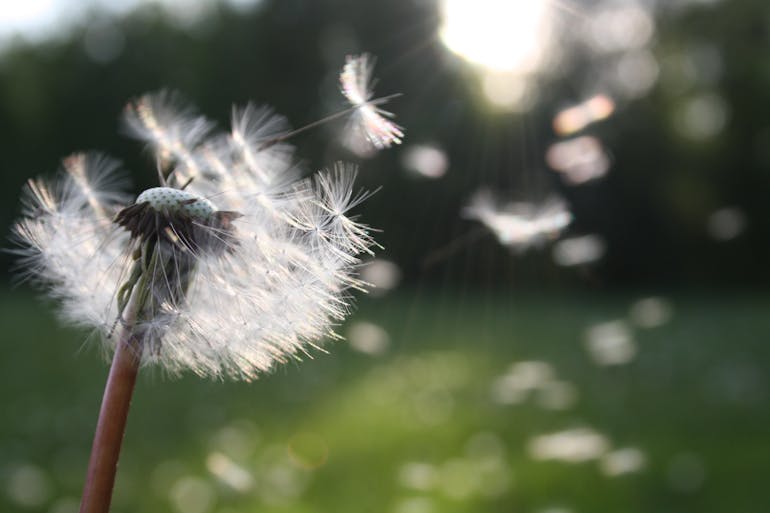Hay Fever
Reviewed and fact-checked by Giulia Guerrini, Superintendent Pharmacist. Read our editorial policy to see how we create informative, accurate content.
Hay Fever (or seasonal allergic rhinitis) is an allergic condition to pollen that affects up to one in five people at some point in their life. It is very common and often underestimated, even though those that suffer severely know that the symptoms can be extremely debilitating.
For this reason it is important to prepare yourself for the pollen season well in advance, so that you start treating symptoms before they become too severe. Recognising the symptoms in time, and treating them at the first onset, is key in order to avoid taking more or stronger medication.
Symptoms
Let’s have a closer look at the symptoms. If you suffer from hay fever you might experience:
- Sneezing and coughing
- A runny or blocked nose
- Itchy, red or watery eyes
- Itchy throat, mouth, nose and ears
- Loss of smell
- Pain around your temples and forehead
- Headache
- Earache
- Feeling tired
If you have asthma, you might also:
- Have a tight feeling in your chest
- Be short of breath
- Wheeze and cough
Even though hay fever doesn't pose a serious threat to your health, it can have a negative impact on a person's quality of life. People with very severe hay fever often find that it can affect their productivity at work or school or be a consistent hindrance in their day to day life.
Who is most likely to be affected
Hay Fever can start at any age, although it usually begins in childhood or during one’s teenage years. Anyone can get hay fever at any point in their life, but if you have a family history of allergies, particularly asthma or eczema, you're more likely to develop this condition. In adults, men and women are equally affected, but in young age it is usually more common in boys than girls.
When you’re most likely to be affected
According to the Met Office, the pollen season can be separated into three sections, starting in March:
- Tree pollen – late March to mid-May.
- Grass pollen – mid-May to July.
- Weed pollen – end of June to September.
Pollen forecast:

Hay fever treatment
Unfortunately at the moment there is no cure for hay fever, but most people are able to relieve symptoms with treatments available over the counter.
Of course avoiding pollen would be the best way to control hay fever, but we know it can be tricky, particularly during the summer months when people tend to spend more time outdoors.
Luckily hay fever can often be controlled using medicine, some of which you can get from us without a prescription and some which are available on prescription from your GP. The right treatment for you depends on the type of symptoms you are displaying and how severe your symptoms are.
Antihistamines
Antihistamines help to relieve a runny nose, sneezing, itching and watery eyes. Some types of antihistamines may result in drowsiness and are best taken before bed. However, newer antihistamines can still keep your symptoms at bay without making you feel drowsy, although this side effect occasionally does occur with some users. Antihistamine can be taken as a preventative treatment. If you know which type of pollen you’re allergic to, you can take them during hay fever season to stop symptoms before they happen. Alternatively you can take them when you think you are developing the symptoms of hay fever.
Eye drops
Eye drops are available from your pharmacist to treat hay fever symptoms that affect your eyes, such as redness, itchiness and watering (allergic conjunctivitis). Sodium Cromoglicate eye drops is the most widely used, as they are both safe and effective.
Nasal Spray
Corticosteroid Nasal Spray are used to treat the inflammation and swelling caused by pollen in the cavities of your nose. They are better than antihistamine tablets at preventing and relieving nasal symptoms, including sneezing and congestion and at relieving itchy, watery eyes. They're most effective if you start using them a couple of weeks before your symptoms would normally begin. Don't be put off by the fact that the spray contains a steroid as the dose is so tiny that it isn't absorbed into the rest of the body.
Decongestant Nasal spray can also be used to help if a blocked nose is your main problem. There is a wide range of decongestant nasal spray available without prescription, ask our pharmacist which one suits you the most.
Salt water (saline) solutions are also available in various types. Inhaling saline solution into your nostrils can help clearing away any allergens, prevent infection, and keep your nose clean. This can be used as well as other treatments.
If your Hay Fever is persistent and doesn’t respond to any of these treatment or stronger treatment on prescription, your GP may suggest a type of treatment called immunotherapy. It involves being exposed to small amounts of pollen over time, to build resistance to its allergic effects. However, this can take many months or even years to work.
Tips and Tricks
Here are some tricks you can adopt to ease your symptoms:
- Wear wraparound glasses to stop pollen from getting into your eyes.
- Put some vaseline around your nostrils to trap the pollen.
- Change your clothes after you have been outside to wash pollen off.
- Rinse your hair regularly just to get rid of the pollens. You don’t need to use shampoo, just a quick rinse in the shower.
- Keep your windows closed as much as you can. Of course we don’t suggest you lock yourself up indoors, but when the pollen count is high this may help avoiding contact with the cause of your hay fever.
- Avoid smoking, this will certainly make your allergy worse.
- Eat plenty of green vegetables, berries, apples and beans. These foods are rich in quercetin, a flavonol which can suppress histamine production.
- Eat food rich in beta carotene as it soothes your sinuses and blocked nose. Foods rich in beta carotene are carrots, spinach, kale, sweet potatoes and all yellow fruit such as apricots and cantaloupe.
- Avoid foods which triggers the release of histamines in your body. These include cured and smoked meat and fish, nuts, cheese, pickled or canned food, shellfish, chocolate and ready meals.
- We you don’t want to hear it, but you should also avoid drinking alcohol, another main histamine trigger.
- If you like natural remedies then you should opt for chamomile tea or nettle tea, they both have anti-inflammatory and antihistamine properties.

